为更好地推进社会性科学议题学习(SSI-L)项目研究,2023年9月20日晚,北京师范大学社会性科学议题学习项目威海区域联盟召开了新学期线上交流研讨活动。会议由联盟秘书长、威海望海园中学副校长于莲花主持,北师大SSI-L项目山东区域负责人、威海市教育教学研究院张涛主任以及威海市11所联盟校的校长、分管领导及骨干教师50余人参加了此次会议。
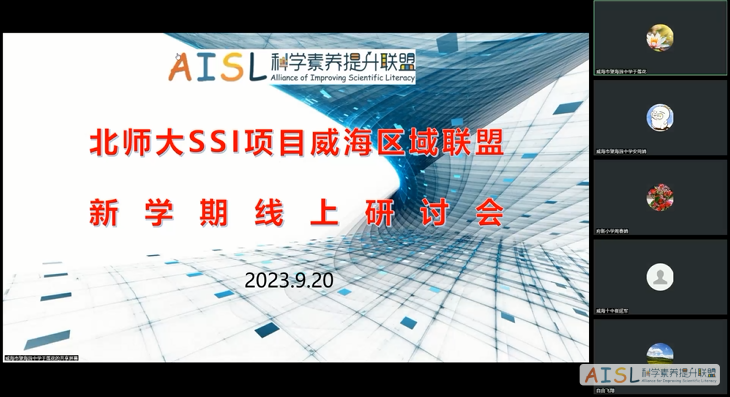
图1 于莲花校长主持会议
本次会议共分为三个阶段。
第一阶段,由威海市望海园中学安同娟老师就社会性科学议题学习活动资料的收集与整理进行经验交流。首先,安老师以《家庭购车你选燃油汽车还是新能源汽车》议题为例,围绕“是什么?为什么做?做什么?怎样做?意义?”五个维度,就社会性科学议题学习项目的开展和成果的梳理进行了详细的解读。然后,从“学习、合作、热爱”三个层面分享了自己在社会性科学议题学习项目研究中的成长历程。最后,介绍了学校在社会性科学议题学习研究方面取得的系列成果,鼓励学校和老师们积极参与到社会性科学议题学习项目中来。
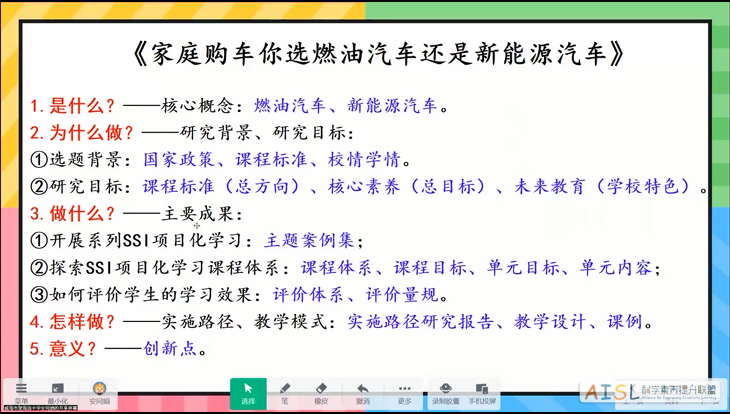
图2 威海市望海园中学安同娟老师做经验分享
第二阶段,由新加入联盟的5所实验校就议题前期开展情况进行汇报,具体介绍议题的驱动性问题、五星图、活动设计和实施情况等,并交流了本学期的工作计划。威海市文登区金山中学研究的议题是《文登抽水蓄能电站到底亏不亏?》《文登到底该不该使用融雪剂?》,威海市望岛小学研究的议题是《垃圾分类后的其他垃圾掩埋处理还是焚烧处理更合适?》,威海市明湖路学校研究的议题是《威海更适合采用风力发电还是水力发电?》,威海市河北小学研究的议题是《烟花该禁还是该放?》,威海市第十中学研究的议题是《威海公交系统使用新能源车好还是传统燃油车好?》。交流结束后,首先由早先加入联盟的学校教师代表结合自己前期的实践经验进行点评,然后张涛主任进行了点评指导。张主任对各联盟校所做议题的优点进行了提炼,也分别指出了各个议题研究中存在的问题。
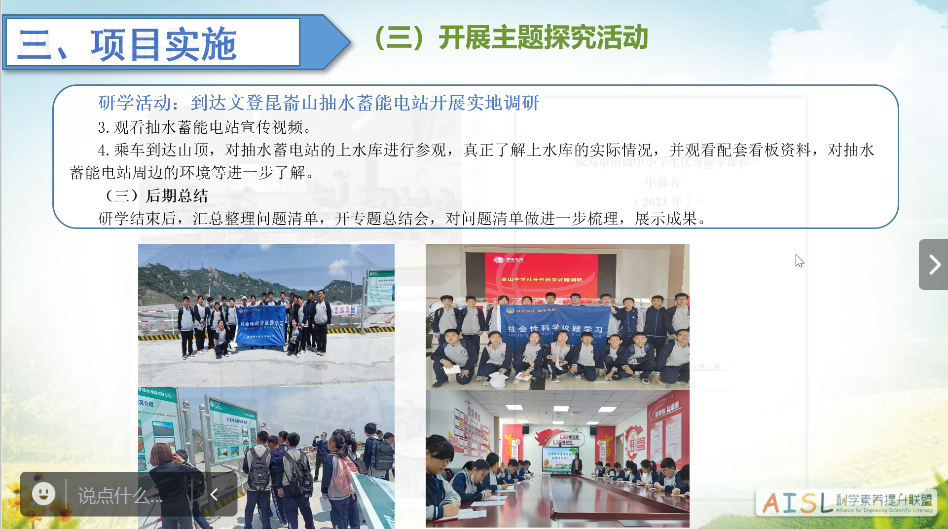
图3 威海市文登区金山中学丛晓燕老师做汇报交流

图4 威海市望岛小学吕林晶老师做汇报交流
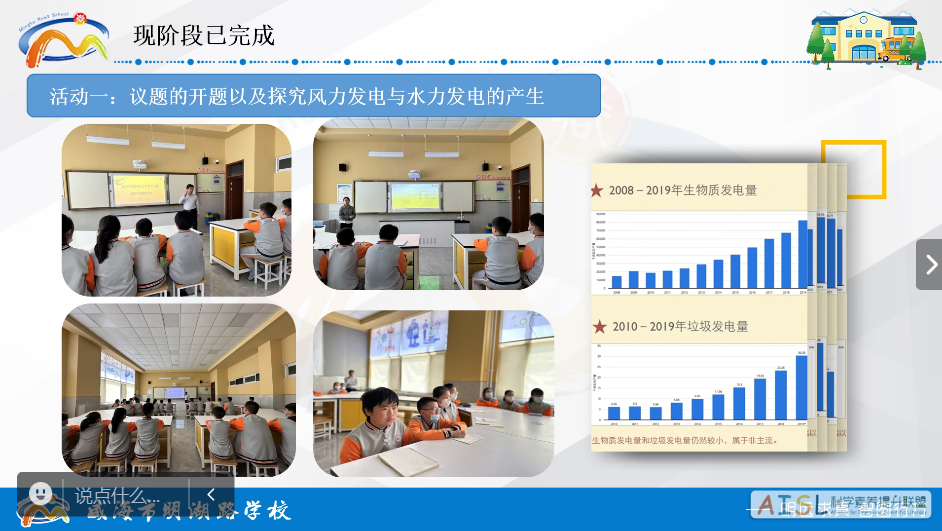
图5 威海市明湖路学校王丽慧做汇报交流
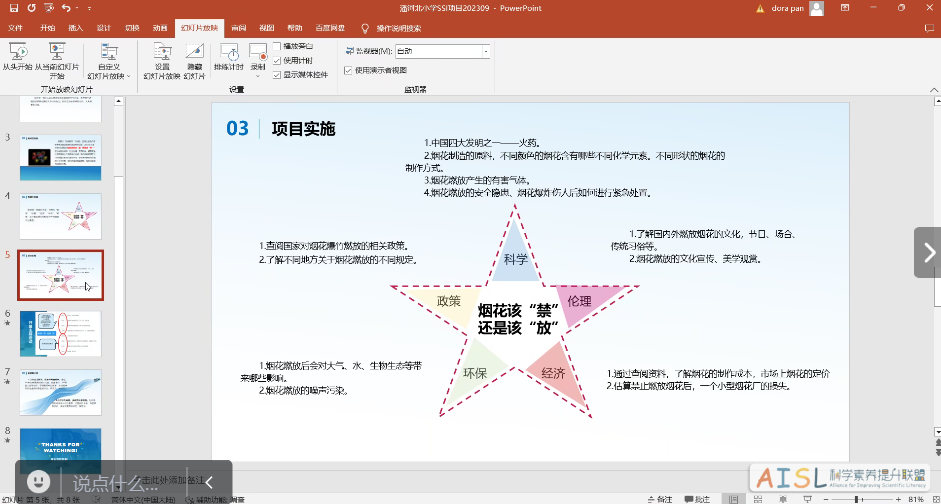
图6 威海市河北小学潘丽珺老师做汇报交流
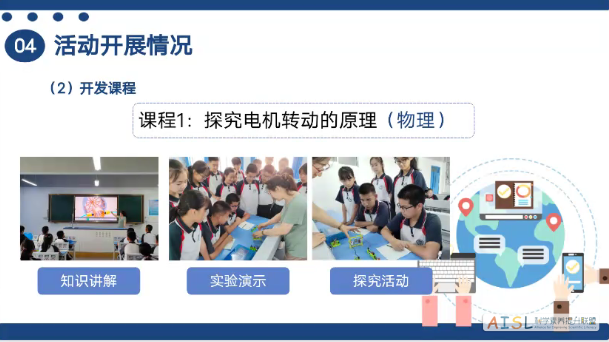
图7 威海市第十中学谭妮妮老师做汇报交流
第三阶段,张涛主任进行了会议总结并部署下一阶段工作。张主任首先充分肯定了各实验学校前期的工作,然后布置了本学期的工作任务,最后对各实验学校今后如何更好地开展议题研究提出了几点建议。张主任要求:一要进一步明确SSI-L项目研究对学校发展、教师成长和学生培养方面的重要意义;二要切实开展SSI-L项目研究活动,不是只停留于计划,更要落实在行动,不能浅尝辄止,而是要做深做细;三要充分利用联盟搭建的平台,加强合作交流,取长补短,共同提高;四要注意总结和提升,归纳梳理好的做法、形成成果,并以此彰显学校办学特色,提高学校办学品位。
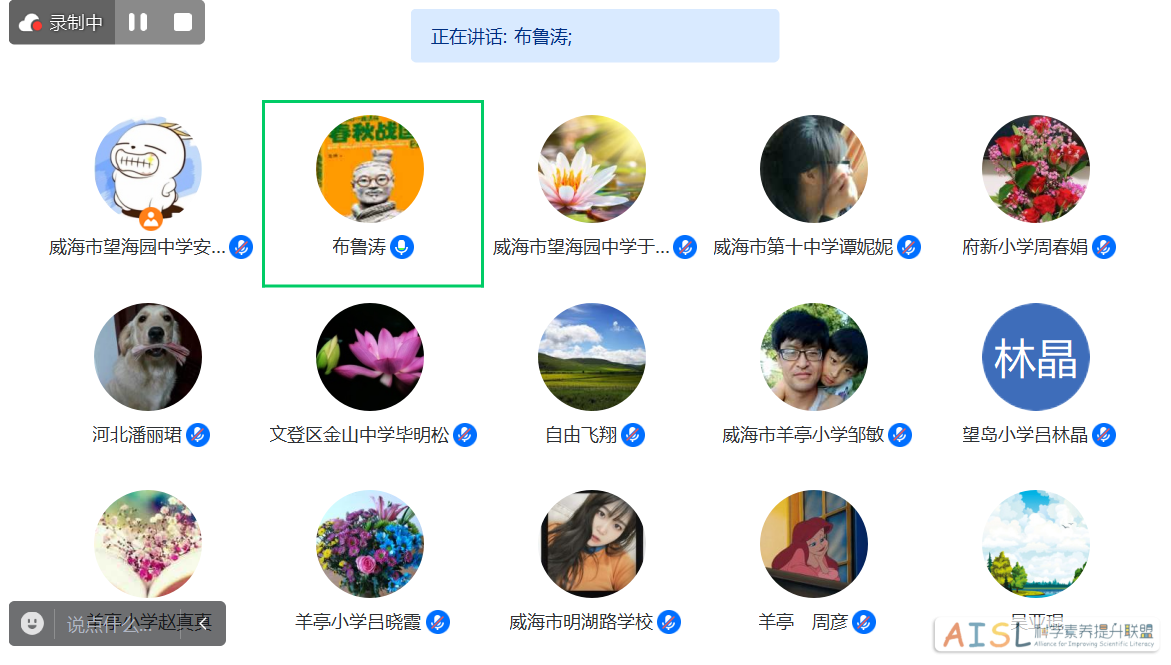
图8 张涛主任进行会议总结部署下阶段工作
此次会议为威海区域各联盟校开展社会性科学议题学习探究带来了新的思路和方向,与会教师对社会性科学议题学习项目的开发与实施有了更深的认识,明确了下阶段的工作目标和工作重点。
图文供稿:威海市望海园中学
To better promote the SSI-L project research, on the evening of September 20, 2023, the Beijing Normal University Socio-Scientific Issues Learning Project Weihai Regional Alliance held a new semester webinar discussion. The meeting was chaired by Yu Lianhua, secretary-general of the Alliance and vice principal of Weihai Wanghaiyuan Middle School. Over 50 people attended this meeting, including Zhang Tao, regional director of the BNU SSI-L project in Shandong area and director of the Weihai Education and Teaching Research Institute, as well as principals, leaders of each division, and backbone teachers of the 11 alliance schools in Weihai.
This meeting was divided into three sessions.
In the first session, An Tongjuan, a teacher from Weihai Wanghaiyuan Middle School, shared her experience in the collection and organisation of SSI learning activity materials. She first took the issue of “Do you choose a petrol-driven vehicle or a new energy one for family car purchase?” as an example, and explained in detail the SSI-L project implementation and research results, focusing on five dimensions — “What is it? Why to do it? What to do? How to do? and meaning?” She then shared her growth process in SSI-L project research from three aspects — “learning, cooperation, and passion”. In the end, she introduced a series of results that have been achieved by her school’s SSI-L project research, and encouraged schools and teachers to actively participate in SSI-L projects.
In the second session, the five experimental schools that newly joined the alliance reported on the early development of their SSI-L projects, introduced in specific the motivating questions, the five-star map, activity design and implementation, etc., and exchanged with each other their work plans for this semester. The issue studied by Jinshan Middle School in Wendeng District, Weihai City is “Does Wendeng Pumped Storage Power Station Lose Money?” “Should it use snow melters?”, the issue of Wangdao Primary School in Weihai City is “Is it more appropriate to landfill or incinerate other waste after classification?”, the issue of Weihai Minghu Road School is “Is Weihai more suitable for wind power generation or hydropower generation?”, and the issue of Hebei Primary School in Weihai City is “Should fireworks be banned or not?”, and the issue of Weihai No. 10 Middle School is “Is it better to use new energy vehicles or traditional petrol-driven ones in Weihai’s public transportation system?”. After the exchange, teacher representatives from those schools which had joined the alliance earlier first made comments based on their early practical experience. Director Zhang Tao then provided comments and guidance. Zhang summarised the advantages of the issues studied by each alliance school and pointed out their problems existing in issue research one by one.
In the third session, Director Zhang Tao summed up the meeting and made work plans for the next stage. He first fully affirmed the preliminary work of each experimental school, then assigned work tasks for this semester, and put forward some suggestions on how each experimental school can better carry out their SSI research in the future. Zhang’s requests are: first, schools should further clarify the importance of SSI-L project research to school development, teacher growth, and student training; second, schools must effectively carry out SSI-L project research activities, not just staying on plans, but putting them into action, not just scratching the surface, but implementing them in depth and detail; third, schools should make full use of the platform built by the alliance, strengthen cooperation and exchanges, learn from each other’s strengths, and improve themselves in a joint manner; fourth, schools should pay attention to summary and improvement, sort out good practices and develop into research results, thereby highlighting each school’s operation characteristics and improve school operation quality.
This meeting brought new ideas and directions to the alliance schools of Weihai in conducting SSI learning and research. Teachers who participated in this meeting had a deeper understanding of the development and implementation of SSI-L projects and clarified their goals and priorities for the next stage work.
